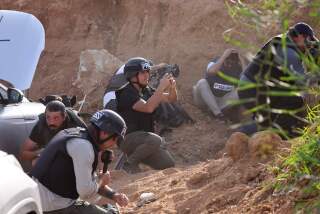Media’s Role in Iraq War
- Share via
Last month you ran a piece by Marjorie Miller about the Cuban press that implies that the American press differs from that of Castro’s Cuba in that American reporters can “challenge the regime” (“Under Castro, Cuban Journalists Raise Issues--but Little Else,” March 19). But when, exactly, did The Times oppose the “Bush regime”? Miller says, for example, “Cuba’s state-run media reflected their government’s position on the war against Iraq.” Would you seriously argue that the mainstream media in America in any way resisted our government’s position?
Quite often The Times went out of its way to reinforce the official position. As the front page reported the start of the ground war, you ran a Column One called “General Has Heart of a Romantic” (Feb. 25), as though deliberately attempting to balance what we all thought would be a blood bath with the teddy-bear warmheartedness of its principal commander.
The Times has a chance to address a number of policy issues that are even more important now that the ground war is over. These include:
--Detailed, comprehensive assessments (perhaps using foreign sources) of the physical and human destruction of Iraq.
--Reaction to the aftermath and to the American role in the Arab world (from a range of opinion).
--The anti-war movement’s policy objectives and alternatives to military force.
--Investigation of the complex “post-war” mood that goes beyond your almost unbroken series of front-page photos of American flags.
--Coverage of American voices who are calling for the U.S. to accept its responsibility for the destruction we caused (including coverage of those organizing humanitarian aid).
--The prospects for political dissent in America. This could include investigation of 1) public attitudes towards dissent, which during the war seemed close to fascistic; 2) the role of the press in fostering or stifling dissent; 3) police activities in relation to dissenters (the FBI has been questioning student anti-war activists at UC Santa Barbara for weeks).
These are just a few examples of the kind of questions the Bush Administration does not sponsor, but which a free press with the “global resources” of The Times might “raise,” as the Cuban press manages to do.
CHRISTOPHER NEWFIELD
Santa Barbara
More to Read
Sign up for Essential California
The most important California stories and recommendations in your inbox every morning.
You may occasionally receive promotional content from the Los Angeles Times.










